CAT based Questions: Seating Arrangement | Logical Reasoning (LR) and Data Interpretation (DI) PDF Download
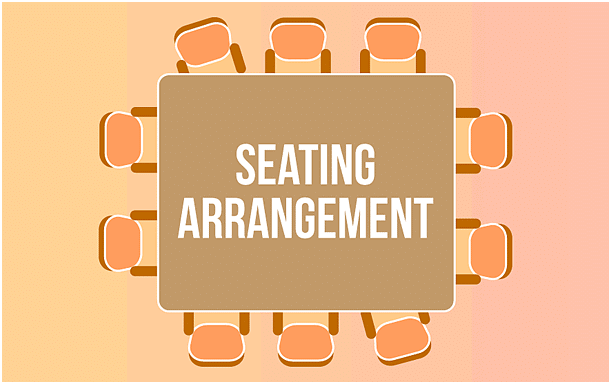
Instructions
Study the following information carefully and answer the questions given below:
Eight persons — E, F, G, H, W, X, Y and Z — are sitting in two parallel rows containing four persons each. E. F, G and H are sitting in row-1 facing north and W. X, Y and Z are sitting in row-2 facing south (but not necessarily in the same order.) Thus, each person sitting in row – 1 faces another person sitting in row – 2, Each of the two rows consists of one Doctor, one Engineer, one Pilot and one Scientist (but not necessarily in the same order).
- The Doctor of row-1 sits second to the right of H. X faces one of the immediate neighbours of H. Only one person sits between the X and the Scientist.
- The one who faces the Scientist of row – 2 is an immediate neighbour of E. Only one person sits between E and the Pilot.
- W sits second to the right of Z. Y does not face G. The Scientist of row-1 faces the Engineer of row – 2.
- G faces one of the immediate neighbours of the Doctor of row-2. The Doctor of row-2 does not sit at any of the extreme ends of the line. Z is not a Doctor.
Q1: If Y and X interchange their places, so do H and Z, then who amongst the following will face E?
(a) Y
(b) H
(c) F
(d) W
Ans: (b)
Sol: In row-1, E,F,G & H are sitting facing north while W,X,Y & Z are sitting in row-2 facing south.
The Doctor of row-1 sits second to the right of H.
Case 1: H sits at extreme left end of row 1.
Also, X faces one of the immediate neighbours of H, => X sits opposite to the person who is immediate right of H and Scientist in row -2 sits at extreme left end.
Now, The one who faces the Scientist of row – 2 is an immediate neighbour of E, => E is doctor in row-1 and H is the pilot.
W sits second to the right of Z, => W sits at extreme right end of row-2 and Z to the immediate left of X. Only position left in row-2 is extreme left end, which is now filled by Y being the scientist. The arrangement is: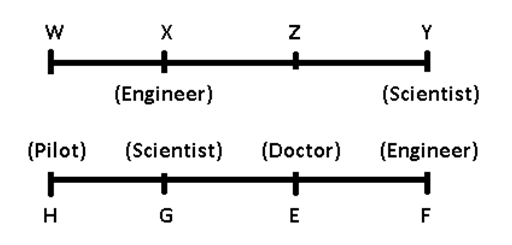
But doctor of row(II) does not sit at end and Z is also not the doctor. Thus, this case is not possible.
Case 2: H sits at second from left end of row-1, => Doctor sits at extreme right end in this row.
Also, X faces one of the immediate neighbours of H, => X sits at extreme right end of row-2 and the scientist sits second to the left of X.
Now, The one who faces the Scientist of row – 2 is an immediate neighbour of E, => E is doctor in row-1 sitting at extreme right and H is the pilot.
W sits second to the right of Z, => W sits to the immediate left of X and Z to the extreme left end of row-2. Only position left in row-2 is occupied by Y being the scientist.
Since, Y and G does not sit opposite to each other, => G sits at extreme left end of row-1.
The arrangement is: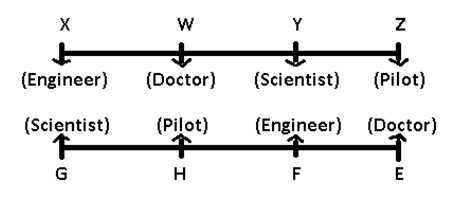
Currently, Z is facing E, if Z and H interchange their positions, then H will face E.
Q2: Which of the following represent both the immediate neighbours of Y?
(a) Z and the Scientist of row-2
(b) X and the Engineer of row-2
(c) W and the Doctor of row-2
(d) W and the Pilot of row-2
Ans: (d)
Sol: In row-1, E,F,G & H are sitting facing north while W,X,Y & Z are sitting in row-2 facing south.
The Doctor of row-1 sits second to the right of H.
Case 1: H sits at extreme left end of row 1.
Also, X faces one of the immediate neighbours of H, => X sits opposite to the person who is immediate right of H and Scientist in row -2 sits at extreme left end.
Now, The one who faces the Scientist of row – 2 is an immediate neighbour of E, => E is doctor in row-1 and H is the pilot.
W sits second to the right of Z, => W sits at extreme right end of row-2 and Z to the immediate left of X. Only position left in row-2 is extreme left end, which is now filled by Y being the scientist. The arrangement is: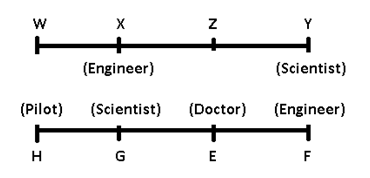
But doctor of row(II) does not sit at end and Z is also not the doctor. Thus, this case is not possible.
Case 2: H sits at second from left end of row-1, => Doctor sits at extreme right end in this row.
Also, X faces one of the immediate neighbours of H, => X sits at extreme right end of row-2 and the scientist sits second to the left of X.
Now, The one who faces the Scientist of row – 2 is an immediate neighbour of E, => E is doctor in row-1 sitting at extreme right and H is the pilot.
W sits second to the right of Z, => W sits to the immediate left of X and Z to the extreme left end of row-2. Only position left in row-2 is occupied by Y being the scientist.
Since, Y and G does not sit opposite to each other, => G sits at extreme left end of row-1.
The arrangement is: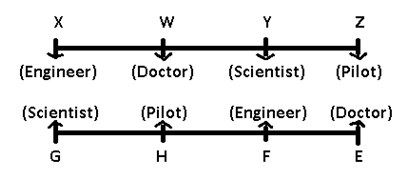
The immediate neighbors of Y are = W (doctor) and Z (pilot).
Q3: Who amongst the following sits to the immediate left of Pilot of row-1?
(a) H
(b) The Doctor of row-1
(c) The Engineer of row – 1
(d) G
Ans: (d)
Sol: In row-1, E,F,G & H are sitting facing north while W,X,Y & Z are sitting in row-2 facing south.
The Doctor of row-1 sits second to the right of H.
Case 1: H sits at extreme left end of row 1.
Also, X faces one of the immediate neighbours of H, => X sits opposite to the person who is immediate right of H and Scientist in row -2 sits at extreme left end.
Now, The one who faces the Scientist of row – 2 is an immediate neighbour of E, => E is doctor in row-1 and H is the pilot.
W sits second to the right of Z, => W sits at extreme right end of row-2 and Z to the immediate left of X. Only position left in row-2 is extreme left end, which is now filled by Y being the scientist. The arrangement is: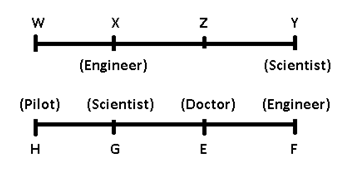
But doctor of row(II) does not sit at end and Z is also not the doctor. Thus, this case is not possible.
Case 2: H sits at second from left end of row-1, => Doctor sits at extreme right end in this row.
Also, X faces one of the immediate neighbours of H, => X sits at extreme right end of row-2 and the scientist sits second to the left of X.
Now, The one who faces the Scientist of row – 2 is an immediate neighbour of E, => E is doctor in row-1 sitting at extreme right and H is the pilot.
W sits second to the right of Z, => W sits to the immediate left of X and Z to the extreme left end of row-2. Only position left in row-2 is occupied by Y being the scientist.
Since, Y and G does not sit opposite to each other, => G sits at extreme left end of row-1.
The arrangement is: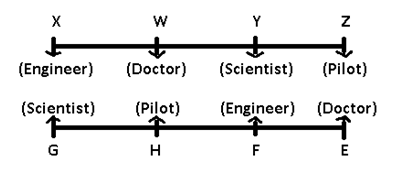
In row-1, the person who is sitting to the immediate left of H (pilot) = G (scientist)
Instructions
Study the following information carefully and answer the following the questions
Eight friends J, K, L, M, N, O, P and Q are sitting around a circle table facing the center. J is not the neighbour of N. L is the third to right of K. Q is second to the left of N, who is the next to the right of L. O is not the neighbour of N or K and is to the immediate left of the P.
Q4: Who is to immediate left of Q?
(a) P
(b) L
(c) Q
(d) J
Ans: (d)
Sol: L is the third to right of K and N is the next to the right of L
=> N is sitting opposite to K.
Also, Q is second to the left of N, => Q is sitting second to the right of K and to the immediate left of L.
O is not the neighbour of N or K, => O is sitting opposite Q and second to the left of K.
Since, J is not the neighbor of N, => J is sitting between Q and K.
The only empty position is taken by M. The arrangement is: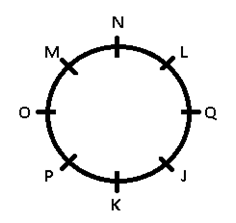
Clearly, J is to the immediate left of Q.
Q5: Who is to the immediate right of K
(a) J
(b) P
(c) Q
(d) Cannot determined
Ans: (a)
Sol: L is the third to right of K and N is the next to the right of L
=> N is sitting opposite to K.
Also, Q is second to the left of N, => Q is sitting second to the right of K and to the immediate left of L.
O is not the neighbour of N or K, => O is sitting opposite Q and second to the left of K.
Since, J is not the neighbor of N, => J is sitting between Q and K.
The only empty position is taken by M. The arrangement is: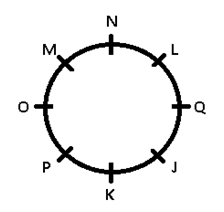
J is to the immediate right of K.
Q6: Which of the following pair of persons represents O ‘s neighbours?
(a) L&N
(b) P&K
(c) M&P
(d) N&P
Ans: (c)
Sol: L is the third to right of K and N is the next to the right of L
=> N is sitting opposite to K.
Also, Q is second to the left of N, => Q is sitting second to the right of K and to the immediate left of L.
O is not the neighbour of N or K, => O is sitting opposite Q and second to the left of K.
Since, J is not the neighbor of N, => J is sitting between Q and K.
The only empty position is taken by M. The arrangement is: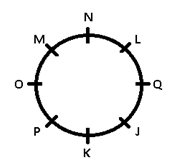
M & P are O’s neighbours.
Instructions
Study the following information carefully and answer the questions giver below.
Eight persons E, F, G, H, W X, Y and Z are sitting in two parallel rows containing four persons each in such a way that there is an equal distance between adjacent persons. E, F, G and H are sitting in row-1 facing north and W, X, Y and Z are sitting in row-2 facing south. (but not necessarily in the same order.) Thus, each person sitting in row-1 faces another persons sitting in row-2 Each of the two rows consists of the one Professor, one Leader, one Technician and one Doctor (but not necessarily in the same order).
- The Doctor of row-1 sits second to the right of H. E is an immediate neighbour of H. E faces the Leader of row-2.
- X sits to the immediate right of the Leader. X faces one of the immediate neighbours of the Professor of row-1. The Professor of row-1 does not sit at any of the extreme ends of the line.
- W sits second to the left of Y. Z does not face G. F faces the Professor of row-2. In both the rows, onlye one person sits between the Professor and the Technician. W is not a Doctor.
Q7: Which of the following represent the people sitting at extreme ends of both the lines?
(a) F, H and Z, W
(b) G, H and X, Y
(c) E, H and Y, Z
(d) G, F and Z, Y
Ans: (d)
Sol: H sits second from the left end of row 1 and the doctor sits second to the right of H, i.e. extreme right end of row-1.
E faces the leader of row-2 and the leader is not at an end since X sits to its right, => E sits to the immediate right of H and opposite to the leader of row-2.
X faces one of the immediate neighbours of the Professor of row-1 and The Professor of row-1 does not sit at any of the extreme ends of the line
=> E is the professor.
Y sits at extreme right end of row-2 and W sits second to the left of it.
Since, Z does not face G, => Z faces F and G sits at extreme left end of row-1. Z is the professor.
In both the rows, only one person sits between the Professor and the Technician, => X and G are technician.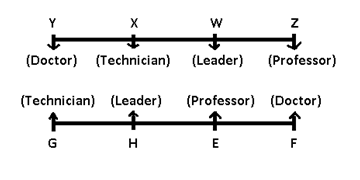
Person sitting at ends are = G, F and Y, Z
Q8: If E and X interchange their places and so do G and Z, then who amongst the following will face W?
(a) X
(b) A
(c) Z
(d) H
Ans: (a)
Sol: H sits second from the left end of row 1 and the doctor sits second to the right of H, i.e. extreme right end of row-1.
E faces the leader of row-2 and the leader is not at an end since X sits to its right, => E sits to the immediate right of H and opposite to the leader of row-2.
X faces one of the immediate neighbours of the Professor of row-1 and The Professor of row-1 does not sit at any of the extreme ends of the line
=> E is the professor.
Y sits at extreme right end of row-2 and W sits second to the left of it.
Since, Z does not face G, => Z faces F and G sits at extreme left end of row-1. Z is the professor.
In both the rows, only one person sits between the Professor and the Technician, => X and G are technician.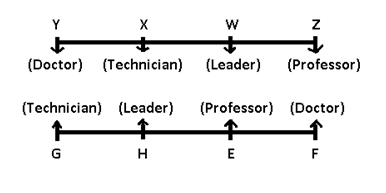
Currently, W is sitting opposite to E, if E and X interchange their position, then X will sit opposite to W.
Instructions
Study the following information carefully and answer the questions given below:
Eight friends — J, K, L, M, N, 0, P and Q — are sitting around a circular table but not necessarily in the same order. Some of them are facing the centre and some of them are facing outside. (i.e. in a direction opposite to the centre.)
Facing the same direction means if one person faces the centre then the other also faces the centre and vice-versa. Facing the opposite direction means if one person faces the centre then the other faces outside and vice-versa.
Immediate neighbours facing the same direction means if one neighbour faces the centre then the other also faces the centre and vice-versa.
Immediate neighbours facing the opposite direction means if one neighbour faces the centre then the other faces outside and vice-versa.
- Only one person sits between K and 0. Q sits third to the right of 0.
- M sits to the immediate right of Q. Q faces outside.
- L sits second to the left of P. P is not an immediate neighbour of 0.
- L faces a direction opposite to that of 0. Immediate neighbours of L face opposite directions.
- J sits third to the left of N. J is not an immediate neighbour of P nor K.
- M and J face a direction same as that of N.
Q9: Who amongst the following are immediate neighbours of P?
(a) M, N
(b) K, M
(c) J, Q
(d) N, K
Ans: (d)
Sol: Q faces outside and M sits to the immediate right of Q.
Also, Q sits third to the right of O and one person sits between K and O
=> K sits second to the left of O, who faces inside.
L sits second to the left of P and P is not an immediate neighbor of O, => P sits second to the left of Q and faces outside.
Since, J is not an immediate neighbor of P, => J sits second to the right of Q and N sits to the immediate left of Q facing inside.
M and J face a direction same as that of N, => M and J also face inside.
The arrangement is: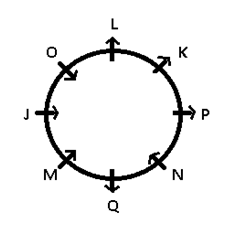
Clearly, N and K are immediate neighbours of P.
Q10: What is L’s position with respect to N?
(a) Immediate right
(b) Second to the right
(c) Third to the right
(d) Third to the left
Ans: (c)
Sol: Q faces outside and M sits to the immediate right of Q.
Also, Q sits third to the right of O and one person sits between K and O
=> K sits second to the left of O, who faces inside.
L sits second to the left of P and P is not an immediate neighbor of O, => P sits second to the left of Q and faces outside.
Since, J is not an immediate neighbor of P, => J sits second to the right of Q and N sits to the immediate left of Q facing inside.
M and J face a direction same as that of N, => M and J also face inside.
The arrangement is: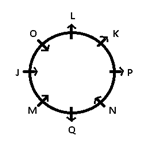
L is sitting third to the right of N.
Instructions: Answer the given questions on the basis of the information given below.
Seven varsity basketball players (A, B, C, D, E, F, and G) are to be honoured at a special luncheon. The players will be seated on the dais in a row. A and G have to leave the luncheon early and so must be seated at the extreme right. B win receives the most valuable player's trophy and so must be in the centre to facilitate presentation. C and D are bitter rivals and therefore must be seated as far apart as possible.
Q11: Which of the following pairs cannot be seated together?
(a) B & D
(b) C & F
(c) D & G
(d) E & A
Ans: (d)
Sol: According to given conditions we can conclude,

- Hence E and A cannot be seated together.
Q12: Which of the following cannot be seated at either end?
(a) C
(b) D
(c) F
(d) G
Ans: (c)
Sol: According to the given conditions, we can conclude:
Hence, F cannot be seated at either end.
Q13: Which of the following pairs cannot occupy the seats on either side of B?
(a) F&D
(b) D&E
(c) E&G
(d) C&F
Ans: (c)
Sol: According to given conditions possible arrangement is as,
 Hence E and G cannot occupy seats on either sides of B.
Hence E and G cannot occupy seats on either sides of B.
Q14: Six persons are playing a card game sitting around a circular table. Suresh is facing Raghubir who is to the left of Ajay and to the right of Pramod. Ajay is to the left of Dhiraj. Yogendra is to the left of Pramod. If Dhiraj exchanges his seat with Yogendra and Pramod exchanges with Raghubir, who will be sitting to the left of Dhiraj?
(a) Yogendra
(b) Raghubir
(c) Suresh
(d) Ajay
Ans: (c)
Sol: The correct original circular arrangement sequence in a clockwise manner is: Suresh, Dhiraj, Ajay, Raghuveer, Pramod, Yogendra.
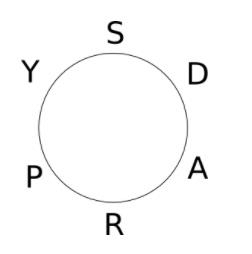 So, after the changes, Suresh is to the left of Dhiraj.
So, after the changes, Suresh is to the left of Dhiraj.
Instructions
P, Q, R, S, T, V and W are sitting in a straight line facing north. Each one of them lives on a different floor in the same building, which is numbered from one to seven.
- Q sits fourth to the left of the person living on the 6th floor.
- Either Q or the person living on the 6th floor sits at the extreme ends of the line.
- Only one person sits between Q and W. W lives on the 3rd floor.
- The person living on the 1st floor sits third to the right of S.
- S is not an immediate neighbour of W.
- Only one person lives between T and the person who lives on the 2nd floor.
- P and R are immediate neighbours of each other. P does not live on the 6th floor.
- One who lives on the 5th floor sits third to the right of the one who lives on the 7th floor.
Note: Solutions for these questions are given at the end of the document. First attempt yourself.
Q15: Who amongst the following lives on the 4th floor?
(a) P
(b) Q
(c) R
(d) S
(e) V
Q16: On which of the following floors does T live?
(a) 1st
(b) 2nd
(c) 5th
(d) 6th
(e) 7th
Q17: How many floors are there between the floors on which V and P live?
(a) One
(b) Two
(c) Three
(d) Four
(e) None
Q18: Four of the following five are alike in a certain way based on the given arrangement and thus form a group. Which is the one that does not belong to that group?
(a) W
(b) T
(c) S
(d) P
(e) Q
Q19: Four of the following five are alike in a certain way based on the given arrangement and thus form a group. Which is the one that does not belong to that group?
(a) T – 2nd floor
(b) R – 7th floor
(c) V – 3rd floor
(d) S – 5th floor
(e) Q – 6th floor
Q20: Which of the following is true with respect to the given arrangement?
(a) The one who lives on the 5th floor is an immediate neighbour of S.
(b) V lives on the 1st floor.
(c) T sits second to the left of the person who lives on the 2nd floor.
(d) R and V are immediate neighbours of each other.
(e) The one who lives on the 4th floor sits at one of the extreme ends of the line.
Q21: If all the persons are made to live in alphabetical order from the bottom-most floor to the top-most floor (i .e. P lives on the 1st floor, Q lives on the 2nd floor and finally W lives on the 7th floor) who would still live on the same floor as the original arrangement?
(a) R
(b) V
(c) W
(d) T
(e) S
Common Solution for the Set:
- The following is the sequence for the given individuals (left to right): Either Q or the person living on the 6th floor sits at the extreme ends of the line. Q sits fourth to the left of the person living on the 6th floor.
- Only one person sits between Q and W. W lives on the 3rd floor. (three arrangements are possible)
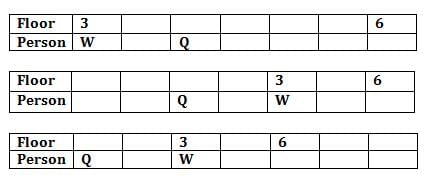
- Here two arrangements are not possible because this statement contradicting The person living on the 1st floor sits third to the right of S. S is not an immediate neighbour of W. So, we are left with the second one So, S can sit left on extreme end.

- Only one person lives between T and the person who lives on the 2nd floor. T will sit between Q & W T will be on the 1st floor.

- Finally, S live on the 4th floor and V lives on the 2nd floor.

- S would still remain on the 4th floor.

Answer 15: (d) S lives on the fourth floor. The correct option is (d).
Answer 16: (a) T lives on the 1st floor. The correct option is (a).
Answer 17: (b) The required number of floors between floor V and P are 2. The correct option is (b).
Answer 18: (c) Because all other alphabets live on odd-numbered floors. Thus, the correct option is (c).
Answer 19: (e) Because the trend is adding one to the current living floor. But in Q it is subtracting 1 floor from the current floor. The correct option is (e).
Answer 20: (e) S lives on the 4th floor sits at one of the extreme ends of the line. The correct option is (e).
Answer 21: (e) S would still remain on the 4th floor. The correct option is (e).
|
77 videos|180 docs|96 tests
|
FAQs on CAT based Questions: Seating Arrangement - Logical Reasoning (LR) and Data Interpretation (DI)
| 1. What is a seating arrangement in the CAT exam? |  |
| 2. How can I solve seating arrangement questions in the CAT exam? |  |
| 3. Are seating arrangement questions time-consuming in the CAT exam? |  |
| 4. What are some common strategies to solve seating arrangement questions in the CAT exam? |  |
| 5. How can I improve my performance in solving seating arrangement questions for the CAT exam? |  |

















